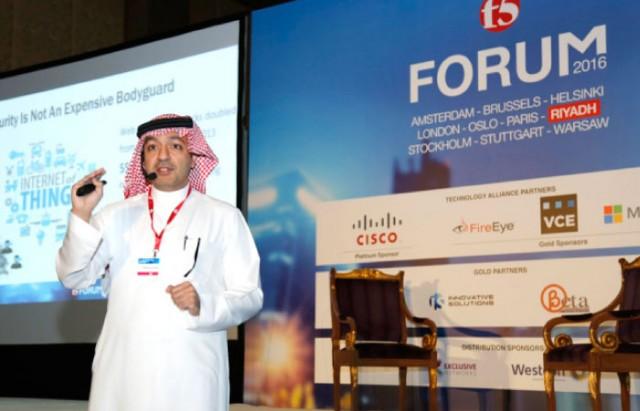
Applications to drive Saudi business success
APPLICATIONS are more vital to business performance, security and availability than ever before, according to new research from F5 Networks. Results of the State of the Application Delivery (SOAD) survey — the only study of its kind worldwide — were revealed in Riyadh at the F5 Networks Forum.
The report, which for the first time includes data from multiple industries across the Middle East and Europe, highlights how businesses are fundamentally changing the way they are run. Key influencing trends include the growing influence of cybersecurity threats, hybrid cloud innovations, as well as innovations related to software-defined networking (SDN) and DevOps.
“Throughout the world and across Saudi Arabia in particular, we are witnessing a shift in the way businesses operate and plan for the future, “said Mamduh Allam, Saudi Arabia general manager, F5 Networks. “Applications and application services are now part of a business’ DNA and can empower people in previously unthinkable ways — irrespective of device or location.”
Application services are increasingly pervasive
The SOAD report noted that 44% of EMEA businesses use over 200 application services every day. The figure is only set to grow further; with 42% of respondents listing mobile applications as a focus for IT spend in 2016.
“The investment in mobile applications also suggests IT decision makers are now truly embracing BYOD, allowing employees to use personal devices in the workplace, running business apps,” said Allam. “It is great to see businesses embracing application services but it is essential that they do so with a clear plan around usage, availability and data protection.”
Hybrid Cloud is the new normal
Interestingly, the report found that 67% of businesses estimate up to 50 % of applications will be hosted in the cloud by the end of 2016 — indicating firms are increasingly opting for a split of on premise and cloud IT. More generally, 30% of surveyed organizations have a ‘cloud-first’ strategy — where cloud-based IT solutions are evaluated before making any new IT investments. This trend is likely driven by small and mid-sized firms, for whom a hybrid cloud environment delivers a greater level of flexibility and potential cost savings.
Security headaches
The survey revealed that a substantial 59% are not confident of resisting an app level security attack. “Considering the rise in corporate cyber security breaches and the damage these attacks caused to reputations and profits, this must be a major concern for c-suite execs,” said Allam.
Encryption of data at rest (59%) and encryption of live data (49%) are listed as two of the top three most important factors in cloud service adoption, further emphasizing the importance of security in the minds of IT decision makers.
Meanwhile, end users — rather than data centers — are increasingly seen as the main weak link in firm’s security policies. Most respondents (22%) said a lack of employee understanding provides the biggest security challenge in the next 12 months. A significant 18 per cent identified the increasing sophistication of attacks at the most significant issue.
In terms of solutions to address these concerns, network firewalls (84%) and anti-virus technology (85%) are the two most deployed security application services for EMEA firms. DDoS protection (57%) appears surprisingly low down the list, considering the growth of such attacks in recent years.
DevOps and SDN are Key to Improving Operational Efficiency
Another key observation from the study was how DevOps and software-defined networking (SDN) can enable automation and orchestration, reduce operating costs and improve time to market.
“SDN separates the “brains” of the network from the physical devices, which can make the network more agile and easier to manage. Importantly, the technology is now proving a fertile innovation platform for DevOps, a model for developing software and services quickly by encouraging standardized communication and collaboration between application developers, IT, and networking professionals,” explained Allam.
SOAD found that 41% of EMEA organizations believe SDN will be “strategically important” to their organization over the next two to five years. About 26% expect to buy SDN technology within the next 12 months. 41% will do so to lower operating costs, 27% to reduce time to market.
Another important and recent SDN and DevOps development is their combined influence on how cloud models are shaped and deployed. Whereas DevOps cloud conversations to date have often focused on public cloud, SOAD respondents seem to associate DevOps more with private cloud. The SOAD report found that of the 43% of participants who see private cloud as strategically significant, 23% also believe DevOps is significant, and almost twice as many (44%) believe the same about SDN.
“This seems to indicate that as organizations develop and deploy applications in their private clouds, they believe DevOps practices together with SDN implementations will give them the agile IT environments they need to meet their business requirements,” added Allam.
Looking ahead
Respondents listed DDoS protection as top of the priority list for security services likely to be outsourced in the next two years. Looking at overall IT spend for 2016; mobile apps, private cloud and physical data center consolidation are the three biggest drivers of IT solution spend in the next 12 months. Meanwhile, mobile apps, private cloud and SaaS are seen as the three most strategically important trends of the next 2-5 years.
The Internet of Things, heralded by many as a game-changer, listed in the bottom four (of twelve), suggesting many in the IT industry feel it’ll be a few years before the benefits of an IoT enabled world can be effectively utilized by businesses.
All change
“Amid all this change, one outcome is clear: applications services will remain the link that enables IT organizations to respond to the requirements that are most vital to the business. Performance, security, and availability services ensure employee productivity – driving positive customer engagement and, ultimately, revenue growth,” said Allam.


























